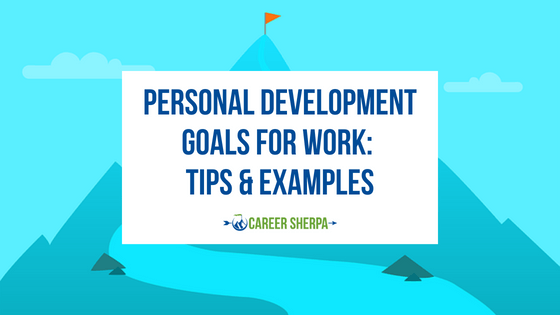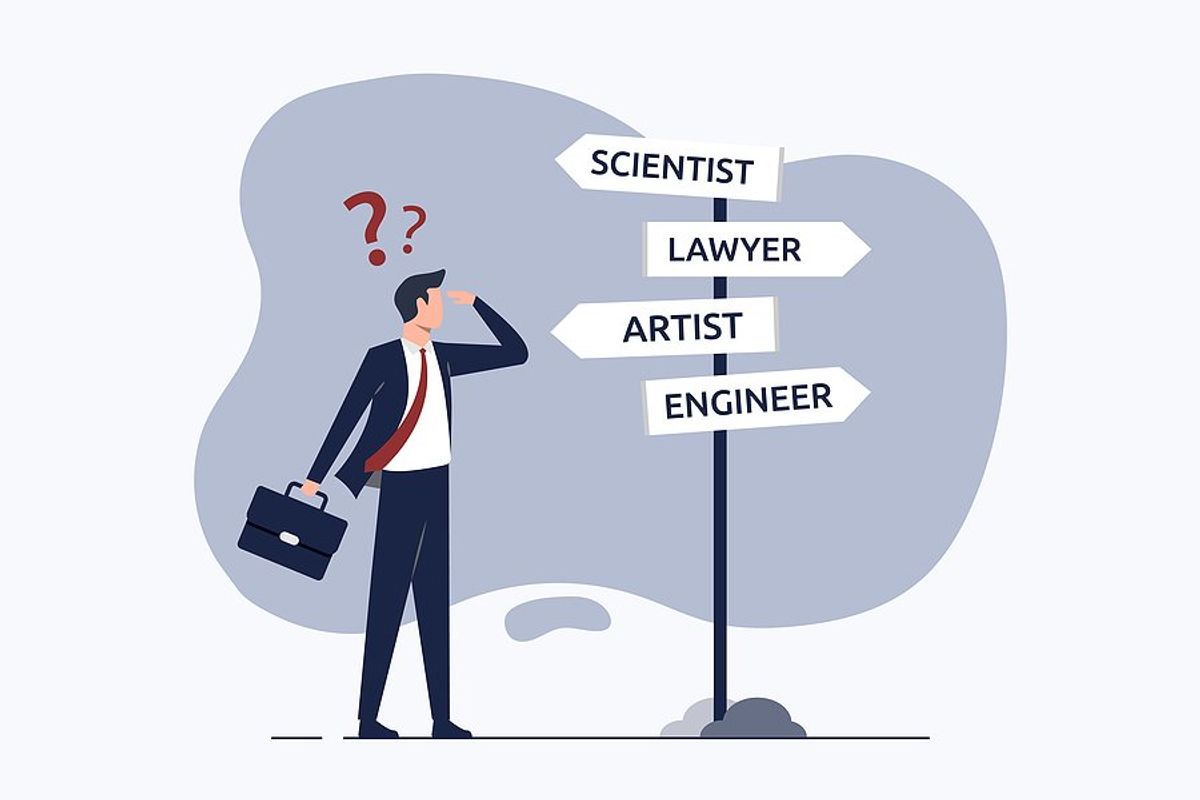Establishing personal development goals for work can be a fantastic way to take your career to the next level. You''ll not only become a more knowledgeable and capable employee, but also a more accomplished person!

This guide goes over setting effective personal development goals, and the benefits they can bring.
What are Personal Development Goals?
Personal development goals are a form of self-improvement that helps you continue pushing your career and life forward. It’s a way to avoid stagnation and strive for something better.
While you may be happy with your life and career, there’s always room to do more. Setting personal development goals motivates you to chase a more fulfilling tomorrow, aligning yourself with what you truly want out of your life. The personal development goals you set for work can help you reach new opportunities, expand your horizons, and achieve the career you’ve always wanted.
It’s about personal and professional growth, and setting the right goals can put you on your way to reaching the upper echelons of success.
How to Set Them
Setting personal development goals for work can seem daunting, but it''s easier than most think. All it takes is dedication and the willingness to follow up on your chosen objectives.
Here are a few tips for setting clear and manageable goals that will lead to long-term growth.
1. Determine What You Want to Improve
The first and often more difficult step is understanding what you want to improve. It requires the ability to self-reflect and identify potential weaknesses you want to change.
Think about your career now and consider where you want to be in both the short and long-term. Once you have a clear picture of the type of growth you want to experience, determine what’s holding you back now. Is it a lack of skills? Or maybe it’s your personal perspective.
To uncover what skills or experience you may be lacking for future roles, don''t just guess. Research job postings (internally and externally) to see what level of skills are required. But don''t stop there. Speak with one or two people who hold the role you aspire to be in. Ask questions about their background and ask what advice they have for you.
Whatever the case, identifying those challenges will help you hone in on what you need to improve. Write a list and use it as motivation for how you want to approach your new personal development goals.
2. Set a Timeline
Every goal you make should be time-bound in one form or another.
One of the biggest mistakes people make when setting personal development goals for work is doing so without timelines. While you may have clear goals in mind and know precisely what you want to improve to further your career, an open-ended time frame turns your goals into nothing more than a wishlist.
Think about when you want to achieve your goals and start working on them today!
Timelines are naturally motivating and can hold you accountable for the steps you do or do not take. Without them, you run the risk of developing an “I’ll get started tomorrow” mindset. Avoid that mistake and know when you want to achieve each goal.
3. Create Your Plan
Every goal you set should be actionable. That means that you can create a step-by-step plan to make them happen. If you don’t know what it takes to achieve a goal, you can’t make progress or even initiate the first step.
Think about how you’ll accomplish your personal development goals and what it takes to cross the finish line. Lay out your plans in as much detail as you need. You can create a flow chart, create a to-do list, or set mini-goals contributing to the larger objectives.
When you figure out your plan, you can determine what actions you need to take. Think of it as a play-by-play guide that puts your personal development goals for work into reach.
4. Stay Consistent
Our final tip is to stay consistent.
Personal and professional development takes time. The key to success is to stay vigilant and frequently review your goals.
Check your progress periodically to track how far you’ve come in meeting your short-term and long-term goals. Definitely be sure to document how the improvements you’ve made thus far are impacting your performance at work and what changes you’ve noticed.
Don’t be afraid to revisit your plans and adjust. Goals can evolve over time, and you may find new ways to improve yourself. Reviewing your plans regularly can also keep you motivated to keep pushing.
Examples of Personal Development Goals for Work
There are many ways to push yourself at work and achieve personal development. We have several examples to inspire you as you set your own personal development goals.
Career-Focused Goals
When you look at personal development goals, they typically fall into two categories. The first are career-focused.
These objectives can improve your professional life and put you on your way to moving into new roles as you chase your dream job.
1. Develop Your Leadership Capabilities
When you look at the natural progression of someone’s career, leadership roles are often one of the first major steps. It’s a great way to advance within a company, and many seek leadership opportunities outside of their organization to continue climbing the career ladder.
One excellent personal development goal for work is to develop your leadership skills. Seek opportunities to gain more experience.
You don’t have to jump into a direct supervisor or manager role. Speak with your current leaders and see if there are opportunities to practice leading a team. They may consider you to lead group projects, plan initiatives, or even take charge during your team’s next offsite activity.
Even something as simple as leading a meeting can give you the experience you need to continue developing important skills. When a leadership position opens, your employers may see your efforts and consider you for a promotion.
2. Pursue a New Technical Skill
Another goal worth pursuing is to develop new technical skills.
It doesn’t matter what industry you’re in or what you do. Technology is ever-evolving, and new skills are always in high demand. Learning how to use a new software platform or tool that enhances your productivity can make all the difference.
It’s your chance to follow industry changes while keeping your skills current.
Approach your supervisor and see what technical skills are needed in the office. There may be new tools your company is interested in exploring. Getting a head start will put you ahead of the pack and make you more competitive.
Alternatively, you can browse similar job descriptions to the one you hold to see what skills other companies are looking for out of new hires.
You can obtain new skills by taking online or in-person courses. Find ways to learn that fit your schedule.
3. Broaden Your Network
Networking is key to continued professional development. However, some people put networking on the back burner once they land a good job.
Don’t rest on your laurels!
Expanding your network is an excellent way to stay current in your industry. You can continue learning about changes, stay in the loop about new opportunities, and gain exposure to innovative ideas. It’s a great way to continue learning and keep your hand on the pulse of your career. And not only that, your network will come in handy if you look for a new job in the future.
Refresh your LinkedIn profile with your new experiences and interact with others. Share content, message individuals in your field, and stay active.
You can also sign up for industry events, join professional groups, and attend gatherings of like-minded individuals in your field.
4. Get Better at Managing Stress at Work
Here’s a great personal development goal for work that can improve your life as a whole in addition to your career.
Stress can be an ever-present obstacle in your day-to-day life. Whether constantly meeting tight deadlines or dealing with on-the-job pressures that keep you on your toes, stress can deeply impact your well-being. It can put you in an unhealthy mental and physical state, so learning how to manage your stress can be game-changing.
Look at how you currently manage stress. What are the biggest sources, and what can you do to make improvements?
Some people employ stress-management techniques like yoga and meditation to wind down after a stressful day. Others combat stress at its source by getting better at task prioritization. Figure out what works for you and take steps to make a change.
It can take time to eliminate stress, but those first baby steps can feel like a huge breath of fresh air into your work life.
5. Improve Your Time Management Skills
Time management and stress go hand in hand. Throughout your career, you’ll juggle timelines, take on more than you can handle, and face an ever-increasing workload. You might have no problems dealing now, but there will come a time when it starts to feel impossible to get everything done.
Improving your time management skills is an excellent personal development goal for work that can change your entire perspective. Not only does it reduce stress, but good time management can also improve your productivity and make finding that coveted work-life balance easier.
There are many ways to experience positive changes. You can use apps to manage your time on specific tasks. Alternatively, you can lean into to-do lists and proper prioritization. Whatever the case, small changes can add up as you fall into a more productive routine.
6. Set Some Long-Term Career Goals
It’s not just short-term goals you should focus on when creating a personal development plan. Long-term growth consists of meeting many smaller objectives that continue to push you further in your career. But what are the larger goals you want to accomplish?
You may want to take on a more impactful role within your industry by becoming an executive-level employee. Alternatively, you may want to start your own business or firm, contributing to your industry on your terms.
Figure out what you want, and set long-term goals you can actively work on during your quest for personal development.
7. Be Adaptable
Another common personal development goal for work is to become more resilient and adaptable. No matter how well you plan and how hard you work, things don’t always go your way. That’s fine, but some people let those missteps affect them far more than they should.
Learning to be more adaptable can help you prepare for the unknown. It’s about pivoting when the situation calls for it and learning to bounce back from hurdles, regardless of how fast they come at you.
Becoming adaptable isn’t something you can learn overnight. However, you can take steps to learn how to be more flexible in the way you work. It’s also possible to develop your resilience, learning to make failures be nothing more than a bump in the road.
8. Do More Reading About Industry Trends
Industry trends are ever-changing, but do you do enough to keep up with them?
Reading more about your industry is a great personal development goal that can benefit you moving forward. Consume as much media about your profession as you can. Subscribe to relevant publications, set up feeds to notify you of news articles, and absorb content whenever possible.
Don’t be afraid to ask your coworkers and people in your network about how they keep tabs on the industry. Simple goals like reading a book about your industry every month can help you become more informed than ever.
9. Become a Better Listener
You may realize you need to set this personal development goal after a few less-than-ideal interactions with colleagues or managers. Active listening is a skill that not everyone has. Things might go in one ear and out the other, resulting in less absorbed information and lackluster communication skills.
When you improve your ability to listen, building trust with coworkers and clients becomes much easier. Furthermore, it helps you communicate more effectively, leading to all-around improvements with every interaction.
Accomplishing this can take time. Consider making small changes like improving eye contact and asking thoughtful questions when talking to someone. Make an effort to listen, and the rest will fall into place naturally.
10. Look for a Mentor
It doesn’t matter if you have an entry-level job or something that requires a few decades of experience under your belt. It’s always good to have a mentor!
Getting a mentor is an excellent goal because it helps you find support. Mentors can provide advice as you navigate workplace challenges. They can also help you progress your career and obtain new skills.
Many companies have mentoring programs. If yours doesn’t have one, you can contact people in your network or find someone at an industry event.
Find people who have accomplished things you aspire to do. Create a pitch, arrange a meeting, and talk about some of your short- and long-term goals. Their advice is worth its weight in gold.
11. Pursue Additional Education & Training
Additional training can be just as beneficial as developing a new technical skill. It’s a way to expand your industry knowledge and gain more qualifications as an employee. Companies love it when workers invest in their continued development, but pursuing additional education can increase your credentials and make you a more competitive worker.
Consider pursuing new certifications. They can make you more qualified to rise to new levels and explore promotional opportunities that help you achieve your long-term goals.
12. Strengthen the Relationships You Have With Your Coworkers
Good professional relationships with coworkers can make a big difference in your career. It might not seem important, but those connections could lead to bigger opportunities in the future.
Furthermore, strong relationships change how you work together. If you’re frequently collaborating, it’ll help you see eye-to-eye and encourage you to find new ways to tap into your individual skills.
A strong team is one that knows each other well. It’s about going beyond skills and capabilities and understanding your unique perspectives. Consider meeting with your team outside of work or working on a volunteer project together. Anything that gives you all something to talk about other than work.
Try to develop a good rapport and build trust. You don’t have to be best friends with everyone, but being cordial and warm toward your colleagues can make a big difference.
Goals for Yourself
In addition to career-focused personal development goals, you should set some that can directly impact your personal life as well. Here are a few that will help make you a more well-rounded professional and individual.
Be Honest With Yourself
Self-reflection isn’t always easy. People tend to get naturally defensive and avoid anything that could “rock the boat” emotionally.
Learning to be honest with yourself can change your entire outlook on your career. Instead of making excuses for yourself, honesty gives you the power to identify the things you need to change. It’s how you take chances and think outside the box to further your career.
This personal development goal can help you spot weaknesses, see where you need to improve and encourage you to look hard at what you truly want out of your career and life. It’s not easy, but make a habit of being more honest with yourself and bold enough to look in the mirror.
Develop More Patience
They say that patience is a virtue, but being patient in challenging situations is often easier said than done.
Becoming more patient can be a transformative personal development goal that impacts your life in many ways. It makes you more confident at work and helps clear your perspective for more powerful decision-making. It can also permit you to make mistakes and chase goals that take longer to see results.
Take Care of Yourself
Self-care affects your professional life more than you realize. You can’t reach the level of success you want if you’re not taking care of your physical and mental health.
Don’t hesitate to unplug and learn how to relish in the activities you enjoy. Make a habit of rewarding yourself for all your hard work, and pay attention to your mind and body’s needs. Invest in self-care, and you’ll be ready to do everything you put your mind to.
Build Emotional Intelligence
Emotional intelligence is the ability to understand and manage your own emotions, as well as recognize and influence the emotions of those around you. You can improve your emotional intelligence in four different areas, self awareness, self management, social awareness, and relationship management.
Developing skills in those areas will help you greatly during the ups and downs of your career. In fact, learning how to manage your emotions will help you in all aspects of your life.
People with strong emotional intelligence tend to be more successful and these skills are sought after in almost every role.
Put the Past Behind You
Learning how to move on from your past is key to moving forward.
Mistakes happen, and failure is inevitable. There will be times when you fall flat on your face. Make it a mission not to let those moments defeat you. There’s so much more to accomplish; letting yourself get wrapped up in your past will only hold you back.
Learn from your mistakes, and don’t let your past define your present and future.
Conclusion
Now that you know some good personal development goals for work, it''s time for you to come up with some for yourself! Investing time in yourself is never a bad thing, and setting goals is a great way to do this.
The post Personal Development Goals For Work: Tips & Examples appeared first on Career Sherpa.









